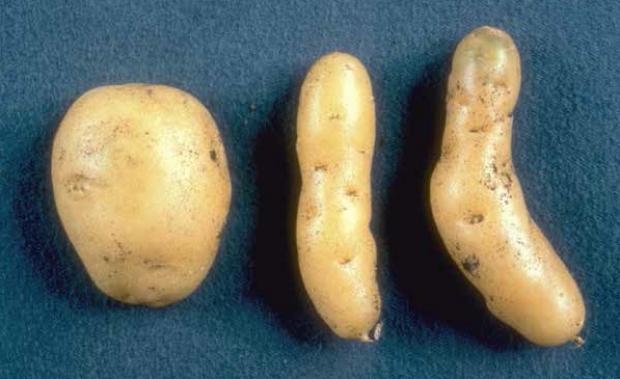Transmission and dispersal
The disease is mechanically transmitted by contact between healthy and diseased plants, tractor wheels, tools, etc. Within potato plants, it is found most readily in the upper leaves and tubers.
Transmission in true seed of potato depends upon the cultivar. PSTVd can pass through both the pollen and ovule.
Long Range dispersal mainly occurs through the movement of infected tubers and true seed.
PSTVd can also be spread by aphids. But this only occurs in the presence of Potato leaf roll virus (PLRV) and is unlikely to be a major problem in the UK.
Symptoms

Mild strains generally cause no obvious symptoms in potatoes. However severe strains in sensitive cultivars may cause foliage to be spindly, very upright, with overlapping leaflets and sometimes with upward rolling of terminal leaflets. Plants will be stunted. Tubers may show the following deformities; small, elongated, cylindrical, spindle or dumb-bell-shaped, with prominent eyes evenly distributed over the tuber, and cracking. Sprouting is slower than in healthy tubers.
Economic impact
Both mild and severe strains of PSTVd exist. Severe strains in sensitive cultivars can reduce yield by up to 40% in individual plants, due to a reduction in both the size and number of tubers. Although infected potatoes are safe for consumption, the quality of the tuber can be severely affected. Losses vary with cultivar, disease strain and season, but are particularly severe under dry conditions. The general pattern is of a progressive decrease in yield with an increase in infection.
Control
There are no chemical or biological controls available to control PSTVd within infected plants. Therefore control is essentially through the use of healthy virus-free seeds or planting material, and good crop sanitation practices. If infection does occur, destruction of infected plants and strict hygiene measures to prevent infection of subsequent crops are the only courses of action.
If you suspect the presence of this disease please contact the DAERA Plant Health Inspection Branch at planthealth@daera-ni.gov.uk, phone 0300 200 7847; or the Agri-Food and Biosciences Inststute (AFBI) at info@afbini.gov.uk .
More useful links
Further information can be found in the following publications:
